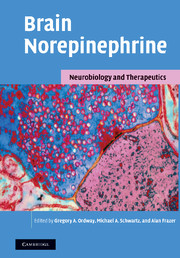Book contents
- Frontmatter
- Contents
- List of contributors
- Acknowledgements
- Introduction: revision of an old transmitter
- Part I The neurobiology of norepinephrine
- Part II Norepinephrine and behavior
- Part III The biology of norepinephrine in CNS pathology
- Part IV Psychopharmacology of norepinephrine
- 17 Actions of antidepressant and other drugs on norepinephrine systems
- 18 The clinical role of norepinephrine antidepressants in depression and anxiety disorders
- 19 Norepinephrine in attention-deficit/hyperactivity disorder
- 20 Psychopharmacology of norepinephrine in eating disorders
- 21 Role of norepinephrine in substance abuse
- Index
21 - Role of norepinephrine in substance abuse
from Part IV - Psychopharmacology of norepinephrine
Published online by Cambridge University Press: 07 September 2009
- Frontmatter
- Contents
- List of contributors
- Acknowledgements
- Introduction: revision of an old transmitter
- Part I The neurobiology of norepinephrine
- Part II Norepinephrine and behavior
- Part III The biology of norepinephrine in CNS pathology
- Part IV Psychopharmacology of norepinephrine
- 17 Actions of antidepressant and other drugs on norepinephrine systems
- 18 The clinical role of norepinephrine antidepressants in depression and anxiety disorders
- 19 Norepinephrine in attention-deficit/hyperactivity disorder
- 20 Psychopharmacology of norepinephrine in eating disorders
- 21 Role of norepinephrine in substance abuse
- Index
Summary
Introduction: defining substance abuse
Drug abuse is a serious medical and social problem affecting millions of people each year. Substance abuse is usually defined as the misuse of drugs, including taking a drug for purposes other than those prescribed or intended. Dependent or addicted individuals engage in compulsive drug seeking and drug taking despite the consequences to self and others. A recent national survey (in the US) on drug abuse estimated 16.6 million individuals classified as substance abuser and/or dependent, with 1.1 million seeking treatment for substance abuse disorders. Both conditions are recognized for their deleterious consequences to individuals as well as society. Therefore, the primary goal of clinicians is to optimize therapies for maladaptive drug-taking behaviors.
This chapter provides an overview of the role of noradrenergic mechanisms involved in the development and maintenance of substance abuse, as well as the integration of the mechanisms mediating the potential adverse consequences of maladaptive drug-taking behavior (i.e., tolerance, dependence, and withdrawal). A wide array of commonly abused substances is discussed. This chapter focuses on the stimulants (i.e., amphetamine and cocaine), but also includes opiates, alcohol, and nicotine. Although some studies to date do not support the clinical efficacy of noradrenergic-based therapies for the treatment of stimulant abuse, others demonstrate a therapeutic potential of noradrenergic compounds for their ability to alleviate the adverse consequences of other abused drugs such as nicotine and opiates.
A substantial literature implicates the role of dopamine in the subjective “rewarding” properties of abused drugs (as defined below).
- Type
- Chapter
- Information
- Brain NorepinephrineNeurobiology and Therapeutics, pp. 610 - 627Publisher: Cambridge University PressPrint publication year: 2007



